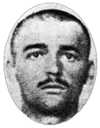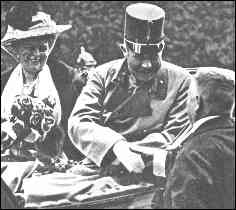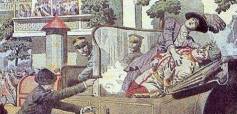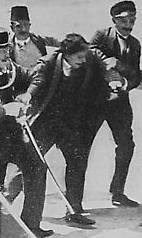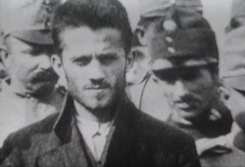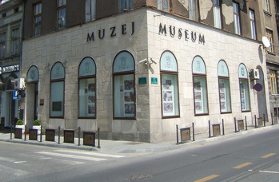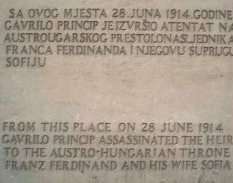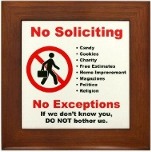|
|
|
 |
|
Gavrilo PrincipThe spark that ignited World War I | |
|
"I am not a criminal, for I destroyed a bad man. I thought I was right." June 28, 1914, was a beautiful sunny day in Sarajevo. Gavrilo Princip sat alone and disconsolate at a sidewalk cafe having coffee. He and his friends had just failed to execute their mission; to kill the heir to the Austro-Hungarian throne Archduke Franz Ferdinand. They had lost a chance to strike a blow for Serbian independence. Earlier in the day, Ferdinand and his wife Sophie had arrived by train on an official visit to Sarajevo. The archduke's advisors knew that a visit to Sarajevo was dangerous because there was a lot of unrest among the populace, but they also knew that it was their duty to go there and "show the flag." |
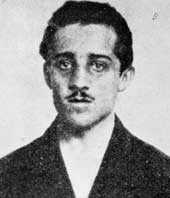 |
| Appearances were an important part of keeping the empire together, but they weren't going to take any unnecessary risks. Ferdinand and Sophie's motorcade was to travel to city hall for welcoming ceremonies, and 120 Sarajevo policemen had been assigned to the parade route. Princip and the other members of the assassination team had also spaced themselves out and blended into the crowds that lined the parade route. As the open car carrying the Archduke and his wife approached, Nedjelko Cabrinovic, one of Princip's co-conspirators, threw a bomb, but it bounced off the car and landed in the street. The bomb exploded under the car that followed, injuring two in the car and several in the crowd. While Cabrinovic was being arrested, the Archduke's car sped off and eliminated any chance of another assassination attempt.
Gavrilo Princip was born in 1894 in Bosnia, the son of a postman and the fourth of nine children. He attended high school in Sarajevo and Tuzla. When Austria-Hungry seized his homeland in 1908, he became a member of Mlada Bosna ("Young Bosnia"), a radical student group dedicated to freeing Bosnia from the grip of the Austro-Hungarian Empire. Gavrilo attempted to join the Serbian army, but was turned down for being too small and weak. He was recruited by a Serbian revolutionary organization called the Black Hand in 1912. The leader of the Black Hand was Colonel Dragutin Dimitrijevic, also known as Apis (Bee) the Chief of the Intelligence Department of the Serbian General Staff. He had hatched the plan to kill the Archduke and recruited Princip and two other men from a coffeehouse in Sarajevo. Though it was clearly a suicide mission, it was an easy sell for "the Bee" because his new recruits were all burning with revolutionary fire as well as tuberculosis. At that time (nearly 100 years ago) that was as good as a death sentence. They knew that they would die soon and so had nothing to lose.
Before the plan could be launched, Nikola Pasic, Serbia's prime minister, heard about the plot and ordered Princip and his co-conspirators arrested when they attempted to enter Bosina. His orders were ignored though, and the trio easily slipped into Sarajevo. All went according to plan - till they blew their chance when the moment of truth arrived. While Princip was finishing his coffee and pondering what had gone wrong, the Archduke's car arrived at city hall. He mounted the podium and the mayor of Sarajevo began his speech as if nothing had happened. Archduke Ferdinand was quite annoyed and interrupted "What is the good of your speeches? I come to Sarajevo on a visit, and I get bombs thrown at me. It is outrageous!" That was the end of the speeches and they all went inside.
Poor Sophie should have listened to Potiorek, but she insisted on staying with Ferdinand because this trip was one of the few times that she had been allowed to appear with her husband in an official ceremony. Back in Vienna, Sophie was an outcast in royal circles because Ferdinand had married below his station. She was not allowed to appear beside him in any official functions in Austria. Ironically, her participation in the ceremonies in Sarajevo was supposed to be a wedding anniversary treat. It was decided that they would all go to the hospital. In what can best be described as either an ill-advised display of bravado or monumental stupidity, the motorcade took the same route they had traveled before. Along the way the Archduke's driver took a wrong turn that put Europe on the road to war. Princip was astonished to see the royal car pass right in front of the cafe where he was standing. When the driver realized that he was going the wrong way, he stopped and began to back up slowly. Princip stepped forward to within five feet of the car, took out his revolver, and fired two shots. Ferdinand was hit in the neck and Sophie was hit in the abdomen. He pleaded "Sophie dear! Sophie dear! Don't die! Stay alive for our children!" But Sophie was already dead and Ferdinand would be dead within a few moments.
Meanwhile, Princip was quickly convicted of murder, but because of his
age he could only be sentenced to 20 years in prison. He died of
tuberculosis in 1918 at the age of 24 at the hospital of Theresienstadt
prison.
Princip's actions that day will always be considered one of the
defining moments of the 20th Century. The ultimate costs of World War One in lives and property were truly
staggering. In four years of war, over half of the 42 million men who
were mobilized became casualties. Over 8 million soldiers and 6 million
civilians died. It has been estimated that the war cost the Allies $125
billion and the Central Powers $60 billion, but the costs of the war
went far beyond lives and property. |
|

